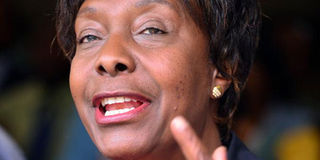We must go beyond naming and shaming

Lands Cabinet Secretary Charity Ngilu addressing journalists at her Ardhi House office in Nairobi on March 30, 2015 as she stepped aside following an order by President Uhuru Kenyatta to top State officers. PHOTO | SALATON NJAU | NATION MEDIA GROUP
What you need to know:
- Most important, President Kenyatta must declare zero-tolerance for corruption and lead from the front in the fight to dislodge it. The forces of corruption must yield if Kenya is to achieve the objectives of Vision 2030.
- We need a strong grassroots movement against the vice. Both children and adults must be taught about the dangers of corruption. This will ensure that it becomes a people’s war rather than a fight by some institutions.
- The Director of Public Prosecutions (DPP) and the Ethics and Anti-Corruption Commission (EACC) have not coordinated their complementary functions. The two agencies must work together to ensure that those involved in corruption are prosecuted, regardless of their position and status.
President Uhuru Kenyatta’s decision to suspend public officials named in connection with corruption is a bold step that will push forward the fight against the vice.
The anti-corruption war should now shift from naming and shaming to prosecution and dismantling of corruption networks.
Kenya scores poorly in fighting corruption. The vice now seems to have become institutionalised. This is what makes anybody who knows the history of this country sceptical that the high-profile corruption cases will ever be prosecuted.
A recent Transparency International corruption index discouragingly ranked Kenya at position 145 out of the 175 countries surveyed. It appears the country’s strategy for fighting corruption is defective.
First, the Director of Public Prosecutions (DPP) and the Ethics and Anti-Corruption Commission (EACC) have not coordinated their complementary functions. The two agencies must work together to ensure that those involved in corruption are prosecuted, regardless of their position and status.
NOT CLEAR
The EACC claims that it has forwarded a number of files to the DPP for action. It is not clear why some few cases have not been prosecuted.
Second, if the President is serious about fighting corruption, he must be prepared to make sacrifices, including losing some of his close allies who have been mentioned in the report. It is politically costly to effectively fight corruption and the top leadership has no option but to bite the bullet if we are to win the war on graft.
The fight is not only a good policy, it is also good politics. The Jubilee administration will succeed or fail on the strength of its ability to fight corruption.
Consider this: an estimated quarter-a-million jobs are lost in Kenya every year as a result of corruption, which drives away investors. With a youth unemployment rate of 70 per cent, the government should be more aggressive in the fight against graft, to create jobs.
Most important, President Kenyatta must declare zero-tolerance for corruption and lead from the front in the fight to dislodge it. The forces of corruption must yield if Kenya is to achieve the objectives of Vision 2030.
ENDEMIC
Lastly, as a country, we must acknowledge that corruption has become so entrenched and institutionalised that it cannot be fought using the mechanisms we have been employing. Corruption is endemic in several institutions and new strategies are required to fight it. The focus should be on getting the public involved.
Indeed, an empowered and informed citizen is a powerful tool against corruption. We need a strong grassroots movement against the vice. Both children and adults must be taught about the dangers of corruption. This will ensure that it becomes a people’s war rather than a fight by some institutions.
We must also invest more in prevention strategies by integrating teaching about anti-corruption in our school curriculum right from the elementary level. Additionally, EACC should embrace technology to improve efficiency and enhance transparency in the fight against corruption. Effective use of technology will enable the public to report corruption cases.
Mr Obonyo is Africa’s representative to the World Bank anti-corruption agency. [email protected]





